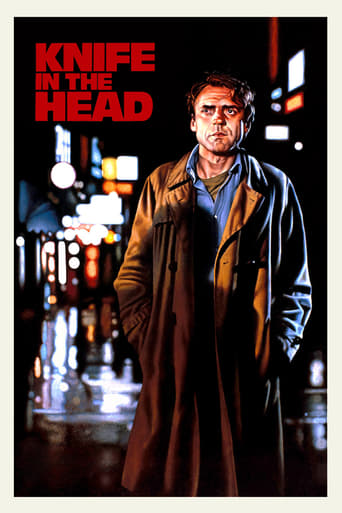

"Messer im Kopf" or "Knife in the Head" (there's actually much more than a knife in the head here) is a West German 105-minute film from 1978, so two more years and this one will have its 40th anniversary. The director and one of the writers is Reinhard Hauff and it is one of his most known works. The cast includes a handful somewhat famous names, such as lead actor Bruno Ganz. His character's wife is played by Angela Winkler who probably was a lot more known back then than she is today. Same can be said about Udo Samel and Hans Christian Blech. And this was a breakthrough film for the young Heinz Hoenig, who scored a German Film Award nomination for his work here, just like Blech. I am not sure I would agree with these nominations though. In my opinion, the heart and soul of the film is Ganz' performance and he elevates the material here by a lot. Strangely enough, he was not nominated, but the film itself was awarded as one of the best German Films of the year. The grand prize went to the Oscar-winning "Tin Drum" though, another very overrated film that is actually similar to this one telling individual fates and stories in the context of politics playing a major role. But back to this one here. I did enjoy the first half and it was tense and nicely done in terms of suspense. But the way, things unfolded after the 50-minute mark was not to my liking at all and I cannot say I was satisfied by the solution and how it all turns out towards the end'. That's why the writing, which is the most important aspect of a film, did not satisfy me here. I have to give it a thumbs-down. Quite a shame after it started so well. Not recommended.
... View MoreIn many ways one might think this an ordinary film. There are no special effects, no beautiful stars, no special flourishes. But every shot is perfect. Every frame is necessary. Every nuance is in place. And Bruno Ganz is absolutely superb at every moment.I first saw this film by chance in the early eighties and have searched and searched ever since -- for 25 years -- in order to see it again. Now it's 2012 and I almost expected to be disappointed. But I am just as impressed as ever, with the superb script and under-stated direction. "Knife In The Head" will hold you in its grip until the very last frame, and only gets better in the last few minutes.It seems odd to say, because in many ways this film seems so darned ordinary, like so many others. But, but, there is some difference. Rather than ordinary, I think it might be one of the best films ever made.
... View MoreIt's astounding that this superb film is so obscure. Bruno Ganz is a well known German actor, and his performance in this film is a technical masterwork. Why has the German film industry not dusted off the master and released it as a DVD? With subtitles it should do well in any country. If it were to be dubbed into English it could be very popular in the UK and US - and German dubbing, though usually in the other direction, is always technically excellent.Ganz's portrayal of a man coming around from severe brain damage is intensely plausible, but accurate as well. Having witnessed the mother of a friend's recovery from a massive stroke, I can confirm its authenticity. The process is eerily similar to accelerated childhood as the blank slate slowly repopulates itself with knowledge, but in a very different way from that experienced by a child, and complicated by traces of lost adult memories.The title of the film - Messer im Kopf/Knife in the Head - is a semantic trick that cleverly sets up the mystery that poor, damaged Hoffmann must solve. Why is a film about someone who has so obviously suffered a *bullet* in the head so named? Despite his crippling affliction, he's sure there is something wrong with the story of his alleged attack on the policeman. Only one person knows...The film's political thrust is perfectly on-target. Police who become the enemies of their own people and protect only their corrupt masters are all too common in the world, and in such circumstances expediency will always triumph over laws or even basic morals. The scene that illuminates this is, I think, the one where the shattered Hoffmann is confronted by the policeman who shot him, and his crippling wounds are contrasted with the insignificant scar on the officer's belly. The unasked question is plain: is Hoffmann's near destruction appropriate punishment for this little blemish? Marvellous film. One point off for being hopelessly unobtainable.CD
... View MoreAccording to reports at the time, the Federal Republic of Germany (or "West Germany," as it was known then,) became somewhat of a police state in the mid-70's.The embarrassing, massive blunder of the Munich '72 Olympics segued into the Baader-Meinhoff, and at some point the German government started using police tactics that had more to do with Orwellian practices than civil rights. This movie reflects that, and it does so while showing the arduous process experienced by its protagonist (admirably played by Bruno Ganz,) who must literally rewire his brain after the forces of the State almost kill him by mistake and then try to blame him in order to cover things up.There must have been a measure of freedom left in W. Germany for this movie to have come out somehow. Is Ganz's recovery (from vegetable back to human being after having had his memory wiped out) an allegory of Germany itself (from Nazism to freedom and back to a police state again)? Go figure. All I know is that is movie left an indelible impression in my mind, which is saying a lot in an era when German cinematography was coming up with a gem every other month.Seek it out.
... View More